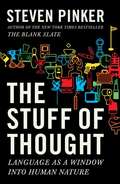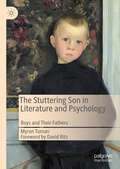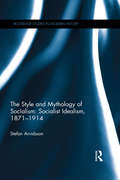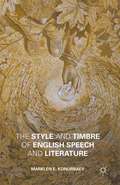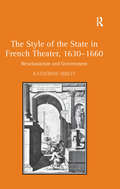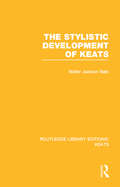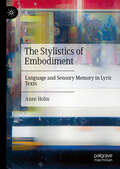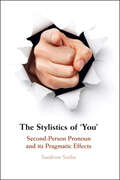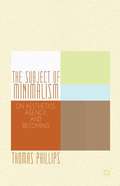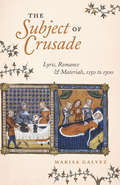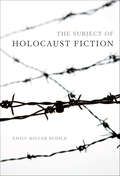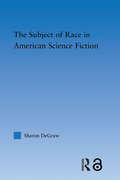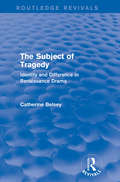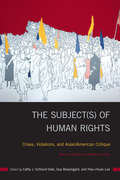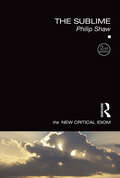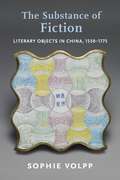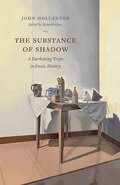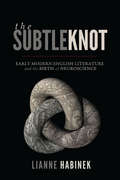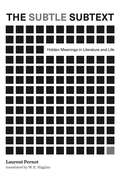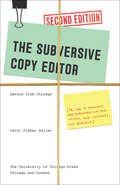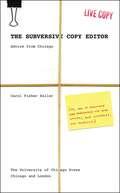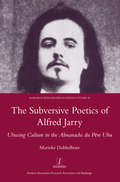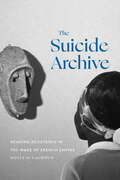- Table View
- List View
The Stuff of Thought: Language as a Window into Human Nature
by Steven PinkerThe author explains how the mind works by examining the way we use words. Pinker takes on scientific questions - such as how language affects thought, and which of our concepts are innate - as well as questions from the headlines and everyday life.
The Stuttering Son in Literature and Psychology: Boys and Their Fathers
by Myron TumanThe Stuttering Son: A Literary Study of Boys and Their Fathers examines stuttering, a condition which overwhelmingly affects boys, in terms of the complex relationships a number of male authors have had with their fathers. Most of these writers, from Cotton Mather to John Updike, were themselves stutterers; for two others, Melville and Kafka, the focus shifts to how similar family tensions contributed to their interest in the related condition of anorexia. A final section looks at the patricidal impulse lurking behind much of this analysis, as evident in Dostoyevsky, Shakespeare’s Hamlet, and Nietzsche. By focusing on the issue of a boy’s emotional development, this book attempts to re-establish the value of a broadly psychological approach to understanding stuttering.
The Style and Mythology of Socialism: Socialist Idealism, 1871-1914 (Routledge Studies in Modern History)
by Stefan ArvidssonArguably no modern ideology has diffused as fast as Socialism. From the mid-nineteenth century to the last quarter of the twentieth socialist ideals played a crucial part not only in the political sphere, but also influenced the way people worked and played, thought and felt, designed and decorated, hoped and yearned. By proposing general observations on the relationship between socialism, imagination, myth and utopia, as well as bringing the late nineteenth century socialist culture – a culture imbued with Biblical narratives, Christian symbols, classic mythology, rituals from freemasonry, Viking romanticism, and utopian speculations – together under the novel term ‘socialist idealism’, The Style and Mythology of Socialism: Socialist Idealism, 1871–1914 draws attention to the symbolic, artistic and rhetorical ways that socialism originally set the hearts of people on fire.
The Style and Timbre of English Speech and Literature
by Marklen E. KonurbaevThe book introduces the reader into the world of mental perception of literary contents. Based on the research in modern semantics, functional stylistics and cognitive phonetics, it explores the way linguistic elements of a literary work cause readers to form a single perception shape identified as a cultural, literary or social stereotype.
The Style of the State in French Theater, 1630–1660: Neoclassicism and Government
by Katherine IbbettEngaging with recent thinking about performance, political theory and canon formation, this study addresses the significance of the formal changes in seventeenth-century French theater. Each chapter takes up a particularity of seventeenth-century theatrical style and staging”for example, the clearing of violence from the stage”and shows how the conceptualization of these French stylistic shifts appropriates a rich body of Italian political writing on questions of action, temporality, and law. The theater's appropriation of political concerns and vocabularies, the author argues, proffers an astute reflection on the practices of government that draws attention to questions obscured in reason of state, such as the instrumentalization of women's bodies. In a new reading of tragedies about government, the author shows how the canonical figure of Pierre Corneille is formally engaged with the political strategizing he often appears to repudiate, and in so doing challenges a literary history that has read neoclassicism largely as a display of pure French style.
The Style's the Man: Reflections on Proust, Fitzgerald, Wharton, Vidal, and Others
by Louis AuchinclossEssays on well-known literary works and artists.
The Stylistic Development of Keats (Routledge Library Editions: Keats)
by Walter Jackson BateThis study, first published in 1945, gives a precise description of the unfolding of a great poet’s craftsmanship and suggests alignments of the technical progression with the changes of the mind. Metrical analysis is given in order to throw light on Keats’ general stylistic development using the simplest terminology and in a traditional manner. Earlier English prosodic writings are referred to throughout in order to place the style and development in the context of the period. Arranged chronologically, each chapter looks at a particular work or group of works drawing together evidence about Keats’ poetic direction. This classic work from a well-known Keats scholar is an important enlightening contribution within the extensive study of Keats’ poetry and letters.
The Stylistics of Embodiment: Language and Sensory Memory in Lyric Texts
by Anne HolmThis book presents a stylistic framework for analysing embodiment in lyric texts. While the assumption that our minds are embodied underlies most approaches in cognitive stylistics (and beyond), a systematic account of the linguistic patterns through which the body may be manifested in poetic expression has not yet been provided. Aiming to fill this gap, the book focuses on contemporary lyric texts that prominently engage the senses in depicting past experiences. Drawing its tools mainly from Cognitive Grammar and research on conceptual metaphors and iconicity, the book investigates how sensory language gives rise to simulated embodied responses. In doing so, the book views poetic expression as a complex interplay of modalities and seeks to expand the concept of the lyric by incorporating digital poetry, song lyrics, performance poetry and lyrical prose among its case studies. The book furthermore brings in current cognitive scientific research on the workings of memory to the analysis of sensory memory, most centrally the psychological phenomenon of mental time travel. It will be of interest to students and scholars working on stylistics, literary studies, and multimodal and intermedial studies.
The Stylistics of ‘You': Second-Person Pronoun and its Pragmatic Effects
by Sandrine SorlinThis book takes 'you', the reader, on board an interdisciplinary journey across genre, time and medium with the second-person pronoun. It offers a model of the various pragmatic functions and effects of 'you' according to different variables and linguistic parameters, cutting across a wide range of genres (ads, political slogans, tweets, news presentation, literary genres etc.), and bringing together print and digital texts under the same theoretical banner. Drawing on recent research into intersubjectivity in neuropsychology and socio-cognition, it delves into the relational and ethical processing at work in the reading of a second-person pronoun narrative. When 'you' takes on its more traditional deictic function of address, the author-reader channel can be opened in different ways, which is explored in examples taken from Fielding, Brontë, Orwell, Kincaid, Grimsley, Royle, Adichie, Bartlett, Auster, and even Spacey's 'creepy' 2018 YouTube video, ultimately foregrounding continuities and contrasts in the positioning of the audience.
The Subject Of Minimalism
by Thomas PhillipsUtilizing a wide range of theoretical and creative texts, Phillips offers an examination of subjectivity as considered, enacted, and embodied, through the frame of minimalist aesthetics. Provocatively, he makes the claim that lived experience is capable of being refined according to the paradoxically rich parameters of a minimalist aesthetic.
The Subject of Crusade: Lyric, Romance & Materials, 1150 to 1500
by Marisa GalvezIn the Middle Ages, religious crusaders took up arms, prayed, bade farewell to their families, and marched off to fight in holy wars. These Christian soldiers also created accounts of their lives in lyric poetry, putting words to the experience of personal sacrifice and the pious struggle associated with holy war. The crusaders affirmed their commitment to fighting to claim a distant land while revealing their feelings as they left behind their loved ones, homes, and earthly duties. Their poems and related visual works offer us insight into the crusaders’ lives and values at the boundaries of earthly and spiritual duties, body and soul, holy devotion and courtly love. In The Subject of Crusade, Marisa Galvez offers a nuanced view of holy war and crusade poetry, reading these lyric works within a wider conversation with religion and culture. Arguing for an interdisciplinary treatment of crusade lyric, she shows how such poems are crucial for understanding the crusades as a complex cultural and historical phenomenon. Placing them in conversation with chronicles, knightly handbooks, artworks, and confessional and pastoral texts, she identifies a particular “crusade idiom” that emerged out of the conflict between pious and earthly duties. Galvez fashions an expanded understanding of the creative works made by crusaders to reveal their experiences, desires, ideologies, and reasons for taking up the cross.
The Subject of Holocaust Fiction (Jewish Literature And Culture Ser.)
by Emily Miller BudickFictional representations of horrific events run the risk of undercutting efforts to verify historical knowledge and may heighten our ability to respond intellectually and ethically to human experiences of devastation. In this captivating study of the epistemological, psychological, and ethical issues underlying Holocaust fiction, Emily Miller Budick examines the subjective experiences of fantasy, projection, and repression manifested in Holocaust fiction and in the reader's encounter with it. Considering works by Cynthia Ozick, Art Spiegelman, Aharon Appelfeld, Michael Chabon, and others, Budick investigates how the reading subject makes sense of these fictionalized presentations of memory and trauma, victims and victimizers.
The Subject of Race in American Science Fiction (Literary Criticism and Cultural Theory)
by Sharon DeGrawWhile the connections between science fiction and race have largely been neglected by scholars, racial identity is a key element of the subjectivity constructed in American SF. In his Mars series, Edgar Rice Burroughs primarily supported essentialist constructions of racial identity, but also included a few elements of racial egalitarianism. Writing in the 1930s, George S. Schuyler revised Burroughs' normative SF triangle of white author, white audience, and white protagonist and promoted an individualistic, highly variable concept of race instead. While both Burroughs and Schuyler wrote SF focusing on racial identity, the largely separate genres of science fiction and African American literature prevented the similarities between the two authors from being adequately acknowledged and explored. Beginning in the 1960s, Samuel R. Delany more fully joined SF and African American literature. Delany expands on Schuyler's racial constructionist approach to identity, including gender and sexuality in addition to race. Critically intertwining the genres of SF and African American literature allows a critique of the racism in the science fiction and a more accurate and positive portrayal of the scientific connections in the African American literature. Connecting the popular fiction of Burroughs, the controversial career of Schuyler, and the postmodern texts of Delany illuminates a gradual change from a stable, essentialist construction of racial identity at the turn of the century to the variable, social construction of poststructuralist subjectivity today.
The Subject of Tragedy: Identity and Difference in Renaissance Drama (Routledge Revivals)
by Catherine BelseyFirst published in 1985, The Subject of Tragedy takes the drama of the sixteenth and seventeenth centuries as the starting point for an analysis of the differential identities of man and woman. Catherine Belsey charts, in a range of fictional and non-fictional texts, the production in the Renaissance of a meaning for subjectivity that is identifiably modern. The subject of liberal humanism – self-determining, free origin of language, choice and action – is highlighted as the product of a specific period in which man was the subject to which woman was related.
The Subject: Crises, Violations, and Asian/American Critique (Asian American History & Cultu #204)
by Edited by Cathy J. Schlund-Vials Guy Beauregard Hsiu-Chuan LeeHuman rights violations have always been part of Asian American studies. From Chinese immigration restrictions, the incarceration of Japanese Americans, yellow peril characterizations, and recent acts of deportation and Islamophobia, Asian Americans have consistently functioned as subordinated “subjects” of human rights violations. The Subject(s) of Human Rights brings together scholars from North America and Asia to recalibrate these human rights concerns from both sides of the Pacific. The essays in this collection provide a sharper understanding of how Asian/Americans have been subjected to human rights violations, how they act as subjects of history and agents of change, and how they produce knowledge around such subjects. The editors of and contributors to The Subject(s) of Human Rights examine refugee narratives, human trafficking, and citizenship issues in twentieth- and twenty-first century literature. These themes further refract issues of American war-making, settler colonialism, military occupation, collateral damage, and displacement that relocate the imagined geographies of Asian America from the periphery to the center of human rights critique.
The Sublime (The New Critical Idiom)
by Philip ShawRelated to ideas of the great, the awe-inspiring and the overpowering, the sublime has been debated for centuries amongst writers, artists, philosophers and theorists and has become a complex yet crucial concept in many disciplines. In this thoroughly updated edition, Philip Shaw looks at: Early modern and post-Romantic conceptions of the sublime in two brand new chapters The legacy of the earliest classical theories, through those of the long eighteenth century to modernist, postmodernist and avant-garde conceptions of the sublime Critical Introductions to major theorists of the sublime such as Longinus, Burke, Kant, Schopenhauer, Nietzsche, Derrida, Lyotard, Lacan and Žižek The significance of the concept through a range of literary readings, including the Old and New Testaments, Homer, Milton and writing from the Romantic period to the present day How the concept of the sublime has affected other art forms such as painting and film, from abstract expressionism to David Lynch’s neo-noir The influence of the sublime on recent debates in the fields of politics, theology and psychoanalysis. Offering historical overviews and explanations, this remarkably clear study is essential reading for students of literature, critical and cultural theory.
The Substance of Fiction: Literary Objects in China, 1550–1775 (Premodern East Asia: New Horizons)
by Sophie VolppDo the portrayals of objects in literary texts represent historical evidence about the material culture of the past? Or are things in books more than things in the world? Sophie Volpp considers fictional objects of the late Ming and Qing that defy being read as illustrative of historical things. Instead, she argues, fictional objects are often signs of fictionality themselves, calling attention to the nature of the relationship between literature and materiality.Volpp examines a series of objects—a robe, a box and a shell, a telescope, a plate-glass mirror, and a painting—drawn from the canonical works frequently mined for information about late imperial material culture, including the novels The Plum in the Golden Vase and The Story of the Stone as well as the short fiction of Feng Menglong, Ling Mengchu, and Li Yu. She argues that although fictional objects invite readers to think of them as illustrative, in fact, inconsistent and discontinuous representation disconnects the literary object from potential historical analogues. The historical resonances of literary objects illuminate the rhetorical strategies of individual works of fiction and, more broadly, conceptions of fictionality in the Ming and Qing. Rather than offering a transparent lens on the past, fictional objects train the reader to be aware of the fallibility of perception. A deeply insightful analysis of late Ming and Qing texts and reading practices, The Substance of Fiction has important implications for Chinese literary studies, history, and art history, as well as the material turn in the humanities.
The Substance of Shadow: A Darkening Trope in Poetic History
by John Hollander Kenneth GrossJohn Hollander, poet and scholar, was a master whose work joined luminous learning and imaginative risk. This book, based on the unpublished Clark Lectures Hollander delivered in 1999 at Cambridge University, witnesses his power to shift the horizons of our thinking, as he traces the history of shadow in British and American poetry from the Renaissance to the end of the twentieth century. Shadow shows itself here in myriad literary identities, revealing its force as a way of seeing and a form of knowing, as material for fable and parable. Taking up a vast range of texts--from the Bible, Dante, Shakespeare, and Milton to Poe, Dickinson, Eliot, and Stevens--Hollander describes how metaphors of shadow influence our ideas of dreaming, desire, doubt, and death. These shadows of poetry and prose fiction point to unknown, often fearful domains of human experience, showing us concealed shapes of truth and possibility. Crucially, Hollander explores how shadows in poetic history become things with a strange substance and life of their own: they acquire the power to console, haunt, stalk, wander, threaten, command, and destroy. Shadow speaks, even sings, revealing to us the lost as much as the hidden self. An extraordinary blend of literary analysis and speculative thought, Hollander's account of the substance of shadow lays bare the substance of poetry itself.
The Subtle Knot: Early Modern English Literature and the Birth of Neuroscience
by Lianne HabinekIn the early modern period, poetic form underpinned and influenced scientific progress. The language and imagery of seventeenth-century writers and natural philosophers reveal how the age-old struggle between body and soul led to the brain’s emergence as a curiosity in its own right. Investigating the intersection of the humanities and sciences in the works of authors ranging from William Shakespeare and John Donne to William Harvey, Margaret Cavendish, and Johann Remmelin, Lianne Habinek tells how early modernity came to view the brain not simply as grey matter but as a wealth of other wondrous possibilities – a book in which to read the soul’s writing, a black box to be violently unlocked, a womb to nourish intellectual conception, a creative engine, a subtle knot that traps the soul and thereby makes us human. For seventeenth-century thinkers, she argues, these comparisons were not simply casual metaphors but integral to early ideas about brain function. Demonstrating how the disparate fields of neuroscientific history and literary studies converged, The Subtle Knot tells the story of how the mind came to be identified with the brain.
The Subtle Subtext: Hidden Meanings in Literature and Life
by Laurent PernotSubtexts are all around us. In conversation, business transactions, politics, literature, philosophy, and even love, the art of expressing more than what is explicitly said allows us to live and move in the world. But rarely do we reflect on this subterranean dimension of communication.In this book, renowned classicist and scholar of rhetoric Laurent Pernot explores the fascinating world of subtext. Of the two meanings present in any instance of double meaning, Pernot focuses on the meaning that is unstated—the meaning that counts. He analyzes subtext in all its multifarious forms, including allusion, allegory, insinuation, figured speech, irony, innuendo, esoteric teaching, reading between the lines, ambiguity, and beyond. Drawing on examples from figures as varied as Homer, Shakespeare, Molière, Proust, Foucault, and others, as well as from popular culture, Pernot shows how subtext can be identified and deciphered as well as how prevalent and essential it is in human life.With erudition and wit, Pernot explains and clarifies a device of language that we use and understand every day without even realizing it. The Subtle Subtext is a book for anyone who is interested in language, literature, hidden meanings, and the finer points of social relations.
The Subtle Subtext: Hidden Meanings in Literature and Life
by Laurent PernotSubtexts are all around us. In conversation, business transactions, politics, literature, philosophy, and even love, the art of expressing more than what is explicitly said allows us to live and move in the world. But rarely do we reflect on this subterranean dimension of communication.In this book, renowned classicist and scholar of rhetoric Laurent Pernot explores the fascinating world of subtext. Of the two meanings present in any instance of double meaning, Pernot focuses on the meaning that is unstated—the meaning that counts. He analyzes subtext in all its multifarious forms, including allusion, allegory, insinuation, figured speech, irony, innuendo, esoteric teaching, reading between the lines, ambiguity, and beyond. Drawing on examples from figures as varied as Homer, Shakespeare, Molière, Proust, Foucault, and others, as well as from popular culture, Pernot shows how subtext can be identified and deciphered as well as how prevalent and essential it is in human life.With erudition and wit, Pernot explains and clarifies a device of language that we use and understand every day without even realizing it. The Subtle Subtext is a book for anyone who is interested in language, literature, hidden meanings, and the finer points of social relations.
The Subversive Copy Editor, Second Edition: Advice from Chicago (or, How to Negotiate Good Relationships with Your Writers, Your Colleagues, and Yourself)
by Carol Fisher SallerLongtime manuscript editor and Chicago Manual of Style guru Carol Fisher Saller has negotiated many a standoff between a writer and editor refusing to compromise on the "rights" and "wrongs" of prose styling. Saller realized that when these sides squared off, it was often the reader who lost. In her search for practical strategies for keeping the peace, The Subversive Copy Editor was born. Saller's ideas struck a chord, and the little book with big advice quickly became a must-have reference for copy editors everywhere. In this second edition, Saller adds new chapters, on the dangers of allegiance to outdated grammar and style rules and on ways to stay current in language and technology. She expands her advice for writers on formatting manuscripts for publication, on self-editing, and on how not to be "difficult." Saller's own gaffes provide firsthand (and sometimes humorous) examples of exactly what not to do. The revised content reflects today's publishing practices while retaining the self-deprecating tone and sharp humor that helped make the first edition so popular. Saller maintains that through carefulness, transparency, and flexibility, editors can build trust and cooperation with writers. The Subversive Copy Editor brings a refreshingly levelheaded approach to the classic battle between writers and editors. This sage advice will prove useful and entertaining to anyone charged with the sometimes perilous task of improving the writing of others.
The Subversive Copy Editor: Advice From Chicago (or, How to Negotiate Good Relationships with Your Writers, Your Colleagues, and Yourself)
by Carol Fisher SallerEach year writers and editors submit over three thousand grammar and style questions to the Q&A page at The Chicago Manual of Style Online. Some are arcane, some simply hilarious -- and one editor, Carol Fisher Saller, reads every single one of them. All too often she notes a classic author-editor standoff, wherein both parties refuse to compromise on the "rights" and "wrongs" of prose styling: "This author is giving me a fit". "I wish that I could just DEMAND the use of the serial comma at all times". "My author wants his preface to come at the end of the book. This just seems ridiculous to me. I mean, it's not a post-face".
The Subversive Poetics of Alfred Jarry: Ubusing Culture in the Almanachs Du Pere Ubu
by Marieke DubbelboerParadox and provocation were essential features of all of the work of Alfred Jarry (1873-1907). His non-conformist attitude, whether employed to subvert literary or artistic conventions or to scrutinize social and political issues, marked both his literary writing and his view of the world. Nowhere is this more apparent than in the experimental and satirical Almanachs du Pere Ubu (1898 and 1901), which to date have received little critical attention. Jarry's groundbreaking use of collage in these early works, his absurdist humour and his rethinking of literary authorship and artistic originality foreshadow many innovations of twentieth-century art and literature. In this generously illustrated study Marieke Dubbelboer examines key characteristics of Jarry's poetics through an analysis of the Almanachs and addresses their role within the European avant-garde.
The Suicide Archive: Reading Resistance in the Wake of French Empire
by Doyle D. CalhounThroughout the French empire, from the Atlantic and the Caribbean to West and North Africa, men, women, and children responded to enslavement, colonization, and oppression through acts of suicide. In The Suicide Archive, Doyle D. Calhoun charts a long history of suicidal resistance to French colonialism and neocolonialism, from the time of slavery to the Algerian War for Independence to the “Arab Spring.” Noting that suicide was either obscured in or occluded from French colonial archives, Calhoun turns to literature and film to show how aesthetic forms and narrative accounts can keep alive the silenced histories of suicide as a political language. Drawing on scientific texts, police files, and legal proceedings alongside contemporary African and Afro-Caribbean novels, film, and Senegalese oral history, Calhoun outlines how such aesthetic works rewrite histories of resistance and loss. Consequently, Calhoun offers a new way of writing about suicide, slavery, and coloniality in relation to literary history.
